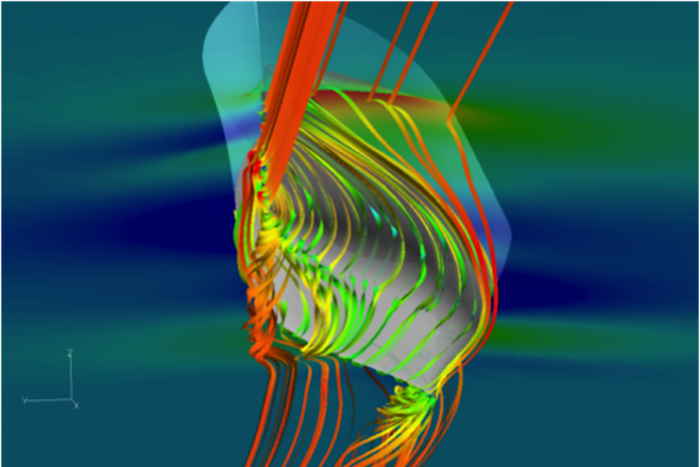
Hydrodynamics for Ocean Engineering (M-TECH HOE)
Master
In Nantes (France)

Advanced training on typical problems of hydrodynamics applied to naval architecture and ocean engineering
-
Type
Master
-
Location
Nantes (France)
-
Duration
2 Years
-
Start date
September
This master specialism aims to give students advanced training on typical problems of hydrodynamics applied to naval architecture and ocean engineering: ship resistance, seakeeping, ship behaviour in irregular seas, water, waves and marine environment... physical, modelling and numerical aspects are studied.
The programme includes theoretical courses on typical hydrodynamics problems: ship resistance, wave induced motions, wave and marine environment modeling ... and numerical methods used to solve these problems. A large part of the programme is also devoted to the practical use of software to solve the problems cited above through a large variety of numerical methods: boundary elements or spectral methods under potential flow theory, finite-difference or finite-volume techniques in solvers for viscous flows, Smooth Particle Hydrodynamics (SPH). Students are also involved in practical work using the ocean test facilities (towing tank, wave tank equipped with an multiflap wave generator etc.)
The programme of study lasts two academic years - denoted by M1 and M2 and is taught in English.
Important information
Documents
- Master MTECH-HOE_web2019.pdf
Facilities
Location
Start date
Start date
About this course
The main objectives are: to build and use models dedicated to hydrodynamics for ocean engineering, to define and perform experiments for free-surface hydrodynamics problems, to solve - numerically - free surface problems for ocean engineering applications
The main prospects for employment after the Master programme are found in the naval industry, shipping, oil sector, coastal engineering or that of marine renewable energies; within R&D departments or design offices. At the conclusion of the Master's degree, graduates can pursue a PhD, in particular within the Laboratory of Hydrodynamics, Energy and Atmospheric Environment, which offers experimental and/or numerical studies, often in cooperation with industrial partners on numerous themes: wave-structure interactions, simulation of sea states on large estates, improvement of the generation and propagation of swell, hydrodynamic impacts, ship damage, marine renewable energies (wave energy, offshore wind etc).
Reviews
Subjects
- English
- Mechanics
- Engineering
- Modelling
- Energy
- Languages
- Marine
- Hydrodynamics
- Naval Engineering
- Wave-structure
Teachers and trainers (1)
Teacher´s Team
Teacher
Course programme
30 ECTS Credits per semester.
Language of instruction: English
Autumn Semester Courses
- Continuum Mechanics
- Fluid Mechanics 1
- Algorithmics for Engineering Modelling
- Numerical Methods
- Vibrations and Differential Equations
- Business Environment
- Modern Languages *
- Fluid Mechanics 2
- Mechanical Design
- Energetics
- Propulsion
- Hydrodynamics
- Conferences and Initiation to Research
- Modern Languages *
* 'French as Foreign Language' except for French native speakers who will study 'Cultural and Communicational English'
NB Course content may be subject to minor changes
Course Content - M2
30 ECTS Credits per semester.
Language of instruction: English
Autumn Semester - Core Courses
- General concepts of hydrodynamics
- Water waves and sea states modelling
- Wave-structure interactions and moorings
- Numerical hydrodynamics
- Experimental hydrodynamics
- Modern Languages *
- Conferences
Autumn Semester - specialisation course (choose one of three)
- Marine Renewable Energy
- Naval Engineering
- Hydrodynamics R&D
Spring Semester Courses
Master thesis / internship
Examples of previous internships in industry:
- Naval numerical computations
- Development of a Fluid-Structure Interaction model for the optimisation of a Wave Energy Converter
- Coupling of VIV on offshore wind turbines
Examples of previous internships in research labs:
- Experimental investigation of the improved dynamic response of barge type floating offshore wind turbines
- Modeling of the response on irregular waves
- Wave-current interactions in a HOS model
The Master's internship can be carried out within the framework of an internship in the Laboratory of Hydrodynamics, Energy and the Atmospheric Environment, but also in other university laboratories (IST Lisbon, NTNU in Trondheim, INSEAN in Rome, University of Auckland ...) or in industry, in France or abroad, on numerical or experimental subjects.
NB Course content may be subject to minor changes
Hydrodynamics for Ocean Engineering (M-TECH HOE)

